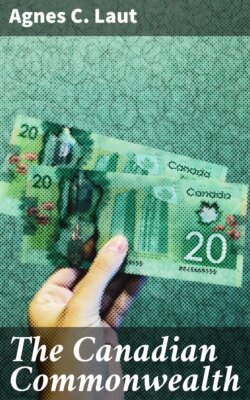Читать книгу The Canadian Commonwealth - Agnes C. Laut - Страница 5
На сайте Литреса книга снята с продажи.
II
ОглавлениеGo back to the beginning of Canada!
She was not settled by land-seekers. Neither was she peopled by adventurers seeking gold. The first settlers on the banks of the St. Lawrence came to plant the Cross and propagate the Faith. True, they found they could support their missions and extend the Faith by the fur trade; and their gay adventurers of the fur trade threaded every river and lake from the St. Lawrence to the Columbia; but, primarily, the lure that led the French to the St. Lawrence was the lure of a religious ideal. So of Ontario and the English provinces. Ontario was first peopled by United Empire Loyalists, who refused to give up their loyalty to the Crown and left New England and the South, abandoning all earthly possessions to begin life anew in the backwoods of the Great Lakes country. The French came pursuing an ideal of religion. The English came pursuing an ideal of government. We may smile at the excesses of both devotees—French nuns, who swooned in religious ecstasy; old English aristocrats, who referred to democracy as "the black rot plague of the age"; but the fact remains—these colonists came in unselfish pursuit of ideals; and they gave of their blood and their brawn and all earthly possessions for those ideals; and it is of such stuff that the spirit of dauntless nationhood is made. Men who build temples of their lives for ideals do not cement national mortar with graft. They build with integrity for eternity, not time. Their consciousness of an ideal gives them a poise, a concentration, a stability, a steadiness of purpose, unknown to mad chasers after wealth. Obstinate, dogged, perhaps tinged with the self-superior spirit of "I am holier than thou"—they may be; but men who forsake all for an ideal and pursue it consistently for a century and a half develop a stamina that enters into the very blood of their race. It is a common saying even to this day that Quebec is more Catholic than the Pope, and Ontario more ultra-English than England; and when the Canadian is twitted with being "colonial" and "crude," his prompt and almost proud answer is that he "goes in more for athletics than esthetics." "One makes men. The other may make sissies."
With this germ spirit as the very beginning of national consciousness in Canada, one begins to understand the grim, rough, dogged determination that became part of the race. Canada was never intoxicated with that madness for Bigness that seemed to sweep over the modern world. What cared she whether her population stood still or not, whether she developed fast or slow, provided she kept the Faith and preserved her national integrity? Flimsy culture had no place in her schools or her social life. A solid basis of the three R's—then educational frills if you like; but the solid basis first. Worship of wealth and envy of material success have almost no part in Canadian life; for the simple reason that wealth and success are not the ideals of the nation. Laurier, who is a poor man, and Borden, who is only a moderately well-off man, command more social prestige in Canada than any millionaire from Vancouver to Halifax. If demos be the spirit of the mob, then Canada has no faintest tinge of democracy in her; but inasmuch as the French colonists came in pursuit of a religious ideal and the English colonists of a political ideal, if democracy stand for freedom for the individual to pursue his own ideal—then Canada is supersaturated with that democracy. Freedom for the individual to pursue his own ideal was the very atmosphere in which Canada's national consciousness was born.
In the West a something more entered into the national spirit. French fur-traders, wood-runners, voyageurs had drifted North and West, men of infinite resources, as much at home with a frying-pan over a camp-fire as over a domestic hearth, who could wrest a living from life anywhere. English adventurers of similar caliber had drifted in from Hudson Bay. These little lords in a wilderness of savages had scattered west as far as the Rockies, south to California. They knew no law but the law of a strong right arm and kept peace among the Indians only by a dauntless courage and rough and ready justice. They could succeed only by a good trade in furs, and they could obtain a good trade in furs only by treating the Indians with equity. Every man who plunged into the fur wilderness took courage in one hand and his life in the other. If he lost his courage, he lost his life. Indian fray, turbulent rapids, winter cold took toll of the weak and the feckless. Nature accepts no excuses. The man who defaulted in manhood was wiped out—sucked down by the rapids, buried in winter storms, absorbed into the camps of Indian degenerates. The men who stayed upon their feet had the stamina of a manhood in them that could not be extinguished. It was a wilderness edition of that dauntlessness which brought the Loyalists to Ontario and the French devotees to Quebec. This, too, made for a dogged, strong, obstinate race. At the time of the fall of French power at Quebec in 1759 there were about two thousand of these wilderness hunters in the West. Fifty years later by way of Hudson Bay came Lord Selkirk's Settlers—Orkneymen and Highlanders, hardy, keen and dauntless as their native rock-bound isles.
These four classes were the primary first ingredients that went into the making of Canada's national consciousness and each of the four classes was the very personification of strength, purpose, courage, freedom.
